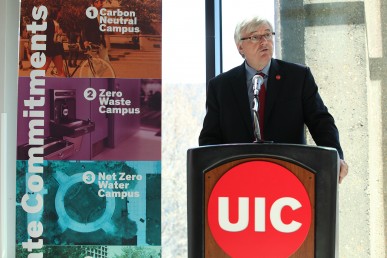Climate Commitments
Chancellor Michael Amiridis and the UIC Office of Sustainability announced four climate commitments during a ceremony Tuesday that aim to confront the challenges of climate change and sustainability on campus.
“Today’s announcement officially establishes UIC as a thought leader in sustainability and higher education, though we have been engaged in the sustainability movement for years,” Amiridis said.

“Today’s announcement officially establishes UIC as a thought leader in sustainability and higher education,” says UIC Chancellor Michael Amiridis. Photo: Jenny Fontaine
Last summer, Amiridis tasked the Chancellor’s Committee on Sustainability and Energy with creating climate commitment action items.
The committee, led by UIC registrar Rob Dixon and physics professor George Crabtree, developed four major goals:
- Carbon neutral campus: reduce carbon emissions
- Zero waste campus: reduce, reuse and recycle to divert 90 percent of waste now sent to landfills
- Net zero water campus: increase water efficiency to use no more water than the amount that falls within UIC’s boundaries
- Biodiverse campus: create a resilient campus landscape that supports plants and animals to increase biodiversity on campus
“I’m glad that the committee set the bar high,” Amiridis said. “If you set the bar high, then we will work to meet these commitments.”
The Climate Commitment document includes aspirational goals and short-term action items that the campus can implement to meet the commitments.
“UIC is a wonderful place where these kinds of aspirations can be reached,” Dixon said.
UIC is at the forefront of “a movement that will lay the foundation for a much healthier campus, for a much healthier city and eventually for a much healthier planet for the future,” Amiridis said.
The goals enhance the 2009 UIC Climate Action Plan, which pledges to reduce the university’s carbon emissions 40 percent below 2004 levels by 2030, and 80 percent below 2004 levels by 2050.
UIC has been a leader of the sustainability movement in higher education since becoming an inaugural signatory of the American College & University Presidents’ Climate Commitment in 2007. UIC was among the first of a group of universities to sign Second Nature’s Climate Commitment newly expanded action plan in 2015, which includes helping the Chicago region become more resilient to a changing climate.
Cindy Klein-Banai, associate chancellor for sustainability, noted that the announcement ceremony itself followed sustainable practices. Only natural light from the windows in the East Terrace of Student Center East provided lighting, refreshments were locally sourced, composting was available and reusable utensils were provided.
“Everything that we need for our survival and well-being depends directly or indirectly on our environment,” she said. “Climate change is one of the greatest threats to sustainability. With these climate commitments, we are taking on a role in working toward the solution.”
The Chancellor’s Committee on Sustainability and Energy is also addressing teaching and learning opportunities in sustainability, Klein-Banai said.
“We are missing a key opportunity if we are not educating our students in the area of climate change,” she said.
